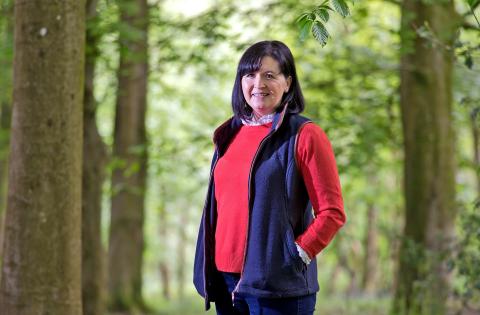Nicola’s first-class honours degree in environmental sustainability with geography gave her a passion for safeguarding the rural environment. For the last 15 years, she’s worked in regeneration and rural development. Since 2017, Nicola and her husband have been developing the 165-acre farm where they breed Welsh mountain sheep, Welsh Mules and Welsh x Charollais, keeping around 350 sheep on a rotational grazing system. They also have 15 acres of woodland. Having achieved most of their initial business goals, Nicola is ready to investigate diversification opportunities.
“I am keen to learn from farms that have established successful agri-environmental systems and on-farm education opportunities and see how silvopasture contributes to better environmental, economic and educational outcomes.”
EXECUTIVE SUMMARY
Welsh lamb producer urges farmers to make good use of demo farm network
A Welsh lamb producer says farmers should take full advantage of the research carried out on demonstration farms to inform their own on-farm decision making.
Nicola Lewis, who has been researching how silvopasture contributes to better environmental, economic and educational outcomes, learned that demonstration farms are an excellent source of information.
“They are testing and taking the risks for demonstration purposes, allowing us to take best practice back to our own farms,’’ says Nicola, whose research was funded by the Farming Connect Management Exchange programme.
One of her visits was to Honeydale Farm, a 43ha demonstration farm in the Cotswolds.
“As this is a demonstration farm it gave an opportunity to see the trials of the silvopasture system and to understand what works and what doesn’t. The farm takes risks for demonstration value to be able to share best practice to others,’’ says Nicola, farms 165 acres with her husband at Pontyclun, Rhondda Cynon Taff, where they run 350 breeding ewes and have 15 acres of woodland.
At another farm she visited, Heather Hill Farm in County Donegal, a holistic approach is taken with emphasis on meeting ecological, social and economical goals.
The farm produces quality grass-fed produce and has integrated tree systems as tools to ensure the soil is as healthy and productive as possible.
“These farming practices build the soil, improve habitats and leave the farm stronger and better for the next generation. Improving the soil is key to the farming practice,’’ says Nicola.
The farm also runs a mob grazing system - a planned grazing system that is turning poor ground into good quality grazing land.
“This is achieved by goats, sheep and cows going through and eating as much vegetation as possible, without going down to the ground through grazing too hard,’’ Nicola explains.
“Once the herbivores are moved off the ground, they are followed by 200 chickens or turkeys and their portable sheds. These omnivores break down the manure from the herbivores and the manure from the chickens which are moved every 48 hours.’’
Under this system, no fertiliser or worm controls are used.
Nicola’s study has made her understand how important it is that farmers take time to look at their farm and to consider the options for making the most of every acre, taking a holistic approach to their farming system.
On-farm education opportunities can also provide additional income, she adds.
MANAGEMENT EXCHANGE REPORT


